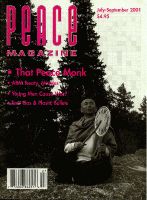
Peace Magazine Jul-Sep 2001, page 27. Some rights reserved.
Search for other articles by Ron Shirtliff here
Anthony Giddens
"We shall never ... become masters of our own history, but we can and must find ways of bringing our runaway world to heel."
Runaway World by Anthony Giddens is a brief (100 page) discussion of globalization and suggestions for taming it.. The book dates back to the BBC 's Reith Lectures of 1999, before the public debate heated up in Seattle in 2000. Neither doomsayer nor optimist, Giddens never retracts his assertion that the world "seems out of our control." A sociologist, his main interests are social and political, rather than the economic changes on our new global world. His chapters are: Globalization, Risk, Tradition, Family, and Democracy.
GlobalizationGlobalization exists, he argues, and not just in trade agreements and institutions such as the World Bank, but also in the communications revolution that began when a commercial satellite was launched in 1969. He cites the revolution in women's attitudes and rights that extends around the world, and the changes to the "traditional" family of most cultures. Globalization impacts much as the industrial revolution did, creating an order unlike the one that existed before, and as the Renaissance before that had created an new world which destroyed the Medieval order. Now it seems that it is time to say good-bye to much of what we have taken for granted in the era of nation states. He credits these new global forces with the disintegration of the Soviet bloc, the fall of apartheid, and the revival of local cultural identities.
The modern world replaces the long dominant ideas of fate, chance, and even nature with the relatively new idea of risk. Lives are no longer ruled by these absolute unknowns, but by risks that can be evaluated, judged, and nudged by human forces. Global warming, genetic engineering, the changing family, and nuclear power are products of the energy that produces globalization, and each comes with a risk factor that may be unpredictable. But, he says, "Understanding and dealing with risk is essential to a dynamic economy and an innovative society." Indeed, "This is a society living after the death of nature."
Our use of the word "traditional" is based more on belief than factual reality, since many so-called traditions are less than a couple of hundred years old. "All traditions are invented, and most are recent inventions, which reduces their value as stored up wisdom." Yet tradition is the glue that gives stability to society and people. The waning of tradition gives personal autonomy, which means that self-identity has to be created and recreated more actively than before, sometimes leading individuals to addiction. Another conflict in the globalized world is between cosmopolitanism, the acceptance of variety and differences, and fundamentalism, which "isn't about what people believe but, like tradition more generally, about why they believe it and how they justify it." Family, the bastion of inequality, is being democratized, with gender equality and sexual freedom. Marriage, once considered a state of nature (it wasn't), is now yielding to relationships based on trust, and increasing risk and potential fulfillment.
"Democracy is probably the most powerful energizing idea of the twentieth century." While a large number of states have become democratic in the past thirty years, in the established democracies there is a disillusionment with governance. "A deepening of democracy is required, because the old mechanisms of government don't work in a society where citizens live in the same information environment as those in power over them." There needs to be a "democratizing of democracy," the strengthening of civic culture which cannot be produced by the market or government alone. "The democratizing of democracy can't stop at the level of the nation state." This cannot happen through the UN - an association of nation states - but it might be built on the model of the European Union to which constituent nations surrender part of their sovereignty. A democratic transnational system could foster democracy in nations and act with unity on such global issues as the potential negative power of giant communications companies, global warming, and chaos following massive capital transfers, as happened in Asia.
Giddens argues that international democratization is the way to deal with the negative potentials of globalization, and that the revival of the former power of nation states is not an answer available to us. He is convincing in his assertion that the impacts of globalization go well beyond trade and commerce. However, he hardly refers to corporate power and does not deal directly with the resulting economic issues or the massive profits that flow to some prime movers. So it strikes this reader that he is only working around the fringes of the issue. I doubt that we can "bring our runaway world to heel" without confronting those who are profiting directly from the new chaos.
Ron Shirtliff is an editor of Peace.

Peace Magazine Jul-Sep 2001, page 27. Some rights reserved.
Search for other articles by Ron Shirtliff here